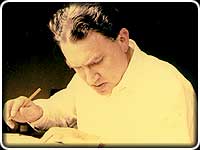|

DIARIO - ULTIME PAGINE
Sequence in six episodes for orchestra
Is the musical account of a serious illness whose conclusion is inevitable.
A heart which gradually starts to lose its regular beat: the irregularly accelerated, hurried, tumultuous beating of this organ pervades the entire composition as a leitmotif (realised in the orchestra by a characteristic non-electronic percussion).
Inexorable, cold the electrocardiogram records the progression of the illness until at last its line lies flat.
This is the same beat which, in the patient’s memory, must have marked out his feelings of love, his successes and failures - all those things that everybody experiences in his life: enthusiasm, disappointments, great and small victories and defeats.
The patient understands, subconsciously, that he will not be saved: he is a man alone, quite alone as one is in extreme moments.
I EPISODE
DISTURBED SLEEP
Sleeping peacefully the man suddenly wakes up, torn by strange blows like bolts of thunder that lacerate his chest.
Terrified he wonders what could have brought this piercing pain to a man who had always been healthy.
Then the throbbing eases and calm returns.
II EPISODE
THUNDERBOLT
The man reflects, then in a sudden flash understands that something very serious has struck his organism. He must call the doctors and submit to their decision.
DIAGNOSIS
The doctors examine him and examine him coldly and cruelly. It is, they state, a grave case. The disease is serious and may be incurable, but he shouldn’ t lose hope - medicine can, at times, do miracles.
III EPISODE
DOUBT
The patient is torn by doubts: he clings on to the last words of the doctors: is there anything that can save him or is he finally condemned?
WORRY
Worry grows and grows (with his heartbeat marking out its growth) until he reaches a state of
TERROR
The man is now prey to terror like a hunted animal. He can hardly convince himself that death is close at hand.
IV EPISODE
RESIGNATION
The patient’s mind is suddenly filled with a sense of demoralisation and physical weariness, and his fear is replaced by a sort of resigned acceptance of his inevitable fate: a short-lived sense of serenity sweeps through his organism and brain.
QUESTIONS
Now the patient anxiously asks himself about the course of the illness which has struck him, its duration and, why not, the possibility of a cure.
HOPE
Hope steps in replacing resignation. The patient takes up his dialogue with himself again, noting that after that terrible night his life has changed but that in the meantime a new element has entered - hope, which has become an integral part of his way of considering the future.
V EPISODE
MEMORIES
With his new-found hope there also emerge his memories: his youth, and especially loves which have represented the truly happy moments of his existence. His heart, which now is sick, knew these intense and accelerated beats when it measured out those moments of exaltation in his past life.
PRAYERS
In this desperate solitude why not approach that Supreme Being who must exist if in the moment of separation he represents the only support to which a man may attach his now tangible hope in a possible afterlife?
VI EPISODE
HALLUCINATIONS
A new attack befalls the man and his mind is now prey to uncontrollable hallucinations: indescribable chaos whirls before his eyes. This is the beginning of the Final Struggle.
EPILOGUE
His heart now beats in time with his approaching fate: in an inexorable, disordered crescendo the entire orchestra underlines this beat until, a little at a time, the heartbeat begins to fail and the electrocardiogram flattens out: this is the final wrench. The mask of pain fades as the serenity of release overcomes and relaxes the corpse’ s face.
Alberto Bruni Tedeschi composed this ballet between 1992 and 1994 when he was in perfect health.
He felt the need to describe the illness and the end of the life of a man.
Strangely, when he had just finished the work and started on another composition with a decidedly more cheerful theme, he fell ill and lived with his illness for one and a half years until the day of his death: exactly as the ballet had foreseen.
He had imagined what would happen to him: the horrors of ‘reanimation’, visions of the hereafter, memories of life, long silences lasting days and days, this unending voyage around oneself in preparation for another voyage into mystery. Detachment from the things and people of his life, punctuated by the attentions of doctors and nurses, the devotion of relatives all ready to save him, by sleepless nights full of hopes and disappointments.
He did not have the possibility of listening to his last work, perhaps he composed it so that ‘after’ we, those who live on, should be able through his music to understand and explain what a man feels as his last moment approaches.
|




|
